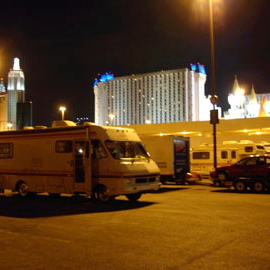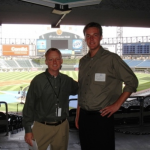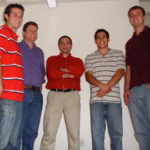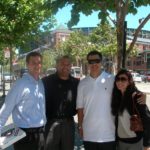 Renee West is the first female president of a property on the Las Vegas strip, but she doesn’t really care that much. “It’s pretty cool,” says Renee, “People make a big deal about it, but I don’t really care that much.”
Renee West is the first female president of a property on the Las Vegas strip, but she doesn’t really care that much. “It’s pretty cool,” says Renee, “People make a big deal about it, but I don’t really care that much.”
As the president of Excalibur, owned by the MGM group, Renee relishes in the autonomy she is allowed. “I don’t own the place,” she says, “But I often get to function like I do.” What began as a career in human resources has now blossomed into a very powerful position, from which Renee is able to pursue her passion: developing people.
Renee lives in “a constant state of growth,” constantly evolving and adapting to new situations. She is open about the decision making process, allowing all employees to see why certain decisions are made, and furthermore, allowing them to freely express their opinions. This has created a community instead of a dictatorship, and her staff appreciates the openness.
When asked to elaborate on the assumed struggles of a woman in a male-dominant world, Renee says that she “experienced very few obstacle because [she] never showed up like [she] was disadvantaged.” Renee advises people to take risks. “I could’ve pushed it more,” she admits. If to do it over again “I would get rid of my limiting beliefs.” She finishes simply, “Don’t listen to the chatter that tells you can’t have it.”
Interview
I ended up with a whole lot of responsibility when I was young. Now I can’t wait to be irresponsible (laughs).
Z: How’d you end up with a lot of responsibility young?
Oh I got married young. I had kids young. By the time I was…how old are you guys?
B: 22 and Zach’s about to be 25 in a week.
When I was 23 I was divorced. I had two kids. I didn’t have an education. I didn’t have a job. I didn’t have any money. That kind of feels real and feels like a lot of pressure.
For me, just the luxury of having an evening alone…that would have been incredible. To be able to do what you guys are doing? Are you kidding me?
As I tell my kids, ‘Look. You got plenty of time to settle down. Go wait on tables in Aspen. Go do something crazy. Go have fun with your life.’ Because once you end up with a lot of responsibility, you’re kind of in it for awhile.
Z: How old are your kids?
My daughter is 28. I have son that’s 26.
Z: Are they having fun right now? What are they doing?
Yeah, they’re having their share of fun. I also have a 19 year old. He’s probably having more fun than anybody (laughs).
My daughter has a child now. But she’s structured her life so that she can still be a mom and do what she wants to do.
B: Cool. So at 23, you did have a lot of responsibility. More than we have.
Yeah. I was a way late bloomer. I kind of bumped around a bit, from a career standpoint I didn’t figure it out until just a couple years ago (laughs). Okay, maybe a little bit sooner than that. But yeah, I kind of got off to a rough start.
Z: So do you feel like you have it figured out now?
I don’t know about that. I feel like I’m in the right place. If that’s having it figured out, I feel like I’m doing what I’m good at. I feel like this is what I want to do. I enjoy doing this. There’s not a day that I don’t want to come to work. How many people can say that? I look forward to coming here every single day. That’s pretty cool.
B: It’s fun?
It’s fun. It’s challenging. I get to think. I work with great people. This is a pretty cool company. You guys just interviewed Gamal, so he probably said the same thing.
We have a real unique opportunity as presidents in this organization for MGM Mirage to really have a ton of autonomy in running our business. While I don’t own this place, I get to function almost like I do.
It’s fun to set strategy and to work collaboratively with a team of people to bring it to life. And to make it real. It’s learning as well.
I feel like one of the things that’s most important to me is to always be in a constant state of growth. Always be learning something. As long as I get to continue to learn, and my job gives me that opportunity, it’s a great day. And it’s a great job.
B: To turn the table on you, because you asked me what I’ve learned in this journey, what have you learned in your stint here at Excalibur?
At Excalibur? Oh gosh, well, there’s been a lot. And it’s not just been here at Excalibur. I’ve been with MGM Mirage for seven years.
To react fast. The business environment can change quickly. Strategy that makes all the sense in the world today, might not make sense tomorrow. When you have a drive in market, and fuel prices go to $4 a gallon, you have to adjust really fast so that you don’t lose momentum. That’s been a fun learning opportunity (laughs).
B: What’s the percentage of visitors you have here? How many people are from California?
Here at the Excalibur, the large majority of our customers are from California. Las Vegas in general, California is our number one market.
B: Is there a percentage?
Yeah and I’ll get confused. I should know this off the top of my head. I can tell you Excalibur is 65%. Las Vegas I want to say is 35%. But that may not be correct. Don’t put that on the website, okay (laughs).
But it’s a big segment here at the Excalibur. Our customers are drive in. A lot of them make last minute decisions to come to Vegas. Things like that can really spin our market.
Other things I’ve learned is just how valuable people are. That’s probably the biggest thing that I’ve learned. It doesn’t matter how magnificient the building is. It doesn’t matter how strong the market is. It’s people that really make the business work and make sense. You can have the best strategy in the world and the best building in the world, and if you don’t have the hearts and mind of the people who work for you and with you, none of it comes to life.
So as a leader, how do you get those hearts and minds on your side?
(laughs). I think the number one thing you have to do as a leader, as far as for me, and what works for me, because where I came from, I can relate very well to our front line employees. I know what it’s like to make tough financial decisions. ‘Should I buy shoes for my kid or do I buy groceries?’ I remember making those kinds of decisions. So never taking for granted what it’s like to be on the front line. I always treat those people with the respect that they deserve. They’re hard working and they really do make our business work.
I think being respectful of them, and truly respectful. Not just being curteous and polite, but having empathy and respect for the job they do and what they bring to it. And really listening to their concerns and doing the best job I can to resolve whatever those concerns are. And then making sure they know what we’re doing. I can remember when I was on the front line, and a decision would come out of the executive that really made our lives more challenging. And it didn’t seem like it made sense for the business and really understanding the logic behind it.
I do my best to communicate at all levels. We’ve made decisions, whether it’s a policy decision or a capital decision or what strategic decision, and made clear the logic behind the decision. Here’s why we’re doing it, and how we think it will affect you. And then be willing to hear back, because we’re not always right.
So I was reading that you’re the first female executive to manage a property on the strip?
Yeah. First female president.
How cool is that?
(laughs) Pretty cool. Yeah.
Is there an award somewhere?
(laughs) You know they didn’t build a monument or anything like that, but it’s kinda fun.
As a woman, was that big obstacle for you to break into this industry?
No. It really wasn’t for me personally. Although, people made a big deal out of it when it happened. I didn’t even think about it. It didn’t even dawn on me until all of a sudden, people were talking about it.
I didn’t ever experience any obstacles. That sounds kind of silly. But people ask me a lot. I hear from a lot of women and minorities about how you keep from being disadvantaged. I say, ‘Don’t show up like you’re disadvantaged.’
I didn’t. It didn’t dawn on me too. So I think the world didn’t react to me like I was disadvantaged. Does that make sense?
B: Yeah definitely. It’s showing up with that confidence.
Maybe it was just dumb luck, but I didn’t know. Apparently I was supposed to be having a difficult time.
That just wasn’t my reality. That wasn’t part of my conscious thinking. Therefore, it wasn’t an issue.
B: That’s interesting.
Z: I was going to say, what’s kind of, we didn’t even get started with this, but your background. How did you get into the hotel business then after having your children so young?
So how’d all that happen?
Z: Right.
I grew up here in Las Vegas. I needed a job, so might as well work for the industry that represents our state. I started my career in Human Resources. Caesar’s is what I consider my launch pad. Caesar’s Palace.
I left Caesar’s after about three years. I decided I wanted to be a consultant. I was working in Human Resources, I was doing training, I was like ‘Heck, I can do this on my own.’
I thought I could make a lot more money. And I was right. I could. There’s lots of business. I was working with lots of gaming companies, both in and out of the state. Lot of travel when you’re consulting. And when you have three kids, that’s tough.
Stations recruited me off the road to come in. That’s when Stations was going through a growth. Their first wave of growth. They wanted to brand their employee culture. So I was hired to work on that project. It was tons of fun. Great company to work for. I enjoyed it a lot. I was there for about three years when I heard the call of the road again.
See I should be out in a motorhome! That’s what I’m supposed to be doing!
I went back out as a consultant again. I guess I was probably a couple years into that when MGM Mirage called and asked if I would go out to Prim, the three properties that are out on the state line.
I initially said no, because I wasn’t looking for a job. I was really enjoying what I was doing. I finally agreed I would go out there as Vice President of Human Resources. MGM Mirage had just purchased those properties. It was a transition. So I said to myself I’d go out there for a year. That was seven years ago.
After two years I was promoted to President of those three properties. And then when we merged with Mandalay Group, I was brought to this property. So that’s the fast version of my background.
So what are you really passionate about? Is it gambling?
(laughs) You know what? I don’t gamble at all. It’s not the gambling. Probably the thing I’m most passionate about is developing people. Early in my days at Caesar’s, I was first hired as a training specialist in HR. I didn’t know anything about training, I just knew that’s what I wanted to do. I probably could have been a teacher to, just as easily.
Then I realized as I was getting into that job, training in an organization is really just communicating vision and values and goals of an organization.
From there I went into organizational development and understanding how training and creating the organization works together. And what happens when you create a strategy and start lining everything up. That’s probably what I’m most passionate about. Developing people to line up behind a strategy, and making sure that you have the right strategy in place. It’s kind of fun to watch it fall together. Then to make the adjustments along the way as you need to. It’s kind of like a big chess game. So that’s fun to me.
B: I want to go back to something because here we are, talking about how you’re the first female executive to manage a property on the strip. You said there’s no obstacles that were in your way. Most people reading this book are going to be like, ‘Yeah, right lady.’
(Laughs)
There’s so many obstacles people face. But from what I’m getting with you, it’s kind of a mindset. If you don’t imagine those obstacles to be there, they’re really not there.
I believe that’s true. I really do. Actually my first job, I’ll tell you a story, and I probably got this from my mom. My mom is one of those ladies who doesn’t take ‘no’ for an answer. Just go get what you want.
It was the summer between my junior year and senior year in high school. My mom told me I had to get a job. At that time I was interested in journalism. That’s what I thought I would do.
So I went to the newspaper in North Las Vegas. It was a little, small newspaper, and I applied for a job. I walked in and the owner/publisher is standing behind the counter and I’m coming in to apply for a job. I ended up interviewing with him.
He recognized immediately that I didn’t have any skills, but he liked me. So he said, ‘I’ll tell you what. I’ll hire you in production, and you can be a typesetter.’ So I said okay. But I didn’t know what a typesetter was. I was pretty sure you had to type.
This was on a Friday afternoon. He said, ‘Come back on Wednesday. You’ll start then.’
So I went home and told my mom. I was pretty excited I got a job at the newspaper. She asked what I was going to be doing. I said, ‘Well, I think I’m going to be typing.’
My mom knew I didn’t know how to type. Her reaction was, ‘Great! You have until Wednesday to learn.’ So I spent the weekend and the next couple days after that learning how to type. That was how my mom thought, or thinks. She still does. ‘Great! You’ve got plenty of time to figure it out.’
That just has carried on through my life.
I think there are people who truly have obstacles that they have to deal with. But I think they see those obstacles. You guys have probably talked to a lot of entrepreneurs in your interviews. If not you probably will. One of the things I’ve noticed when I talk to people who start their own businesses, they see where they are and where they want to be. They don’t see all the bull that’s in the middle. They just plow right through that. It’s the same kind of thinking.
I didn’t see that there were people who would have any issues with me being female. Why? There may be people out there that had an issue with me and I just didn’t recognize it. But it worked out okay.
That’s pretty funny, because like you were saying, you had Friday to Wednesday to learn how to type. That’s kind of transcended into the way that you lead now, and how the one thing you mentioned that you learned is to ‘act fast.’ Adapt.
Yeah. Figure it out. And never say ‘no.’ When someone gives you an opportunity, don’t say no to it. If it’s an opportunity that you’re truly interested in, trust yourself to figure it out. At least go for it! What’s the worst thing that can happen?
When I was offered President out at Prim, I didn’t have any operational experience at all. I’d never held a position in operations. So for a little bit I’m thinking, ‘Okay. What do I know about running the property? It’s not where I’ve spent my time and my focus.’ It dawned on me. ‘I’m smart. I can figure this out. I know I can. Why would I say ‘no.’ Why wouldn’t I at least go for it?’
B: So if you could go back to when you were just getting all that responsibility at 23 years old, and just tell yourself one piece of advice to your 23 year old self, what would you say?
Well I wouldn’t do anything different. Because it’s worked out pretty good for me. But if I were to give myself…it would be to take risks. I think now if I were to look back, even at 23, I could have probably pushed it more. I probably still could have hit the road and done some fun things. But I had limited thinking about what was possible. I guess the advice I would give is to get rid of your limiting beliefs.
Get real clear on what you want. Get real clear on what looks like fun to you at that moment in your life. And doesn’t listen to all the chatter on why you can’t have it.
B: Great. And hop in a motorhome.
And hop in a motorhome (laughs). So where you guys off to next?
B: We’re taking off to Boulder, Colorado tomorrow morning. That’s a layover for us because we’re going to go to Mount Rushmore the next day. Then from Rushmore to Minneapolis to Madison to Chicago. Out to New York and the east coast. We’re going to be on tour for another two months. Today’s our first day of the second leg.
So how are you guys setting up interviews along the way?
B: People are referring us. So if you know of anyone across the country, on the eastern part of the United States, we’d love to talk with them.
Okay. I’ll have to give that some thought and see if I can think of anyone.
It’s basically, we ask that question to the people we interview. ‘Who else can we talk to?’ From that we’ll get one or two people and then contact the people who know the community well. Reporters, organizations that are there. It just has worked out.
That’s fun.
We also like to do impromptu interviews. People just walking by on the street. We have a sweet RV that attracts a lot of attention.
So who owns the RV?
Me.
You do?
Our sponsors bought it for us.
Is it your mom and dad?
No. It’s Jobing.com. They’re actually just trying to establish themselves here in Vegas. They have 18 different locations. They’re headquartered in Phoenix. That’s a pretty interesting story in itself. We were looking for sponsors for six months to do this tour. This is my second tour. I did 75 interviews last summer. Then I went into a year of corporate accounting and hated it.
I was going to ask you what you guys studied.
Both of us were accountants. We both lived together. We’re both auditors. And we both hated our own lives.
Z: We would go home and co-miserate all night.
B: I guess we’re a little more interesting now. Talking with some cool people. It was funny because we were looking for sponsors and just beating our head against the






